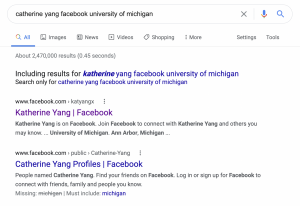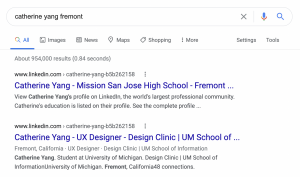Catherine Yang
Contents
Who I Am
It’s difficult to try to gauge what your online identity is like, and how others might perceive you if they find you online before meeting you in person. Ironically, I have actually never thought too much about my digital presence, and yet I've occasionally dug quite deep into someone else’s information online. To start off, my name is quite ordinary, and both my first and last name are common. “Catherine” is an old and consistently used English name, and “Yang” is a very common Chinese last name. I have the typical set of social media accounts, such as TikTok, Instagram, Facebook, and Snapchat, but most of these apps are more associated with usernames rather than my actual full name. When going into the process of searching myself up, I expected that I would probably be able to find some information about myself, such as social media accounts, but not enough information that someone could be sure their search results actually match me.
When I look up “Catherine Yang” in non-incognito mode, the first results that show up seem to be about an author or journalist with the same name. This makes sense, since if someone is publishing articles or writing online for others to see, they would likely have a larger digital presence than me and most other people. Then, around the bottom of the first page, my LinkedIn account shows up. Because my LinkedIn mentions the university I attend, someone who wants to look me up and knows what school I go to could probably be relatively certain that I really am the person on my LinkedIn profile. One other thing I noticed was that at the bottom of the search results, Google also suggests the search “catherine yang grey’s anatomy”. I think this is suggested because one of the characters in the TV show "Grey’s Anatomy" is played by the Asian American actress Cristina Yang. This is really interesting, and I wonder if Google would recommend a similar search if neither I nor the actress had an Asian last name. Thus, I wonder if people with "non-English" first or last names might have a more obfuscated online identity if search engines have been trained more extensively on English names. All in all, after looking at a few of the first pages of the search results, it seems like most of the results were referring to doctors and medical professionals named “Catherine Yang”, and so the only information I really found about myself in the first few pages was my LinkedIn profile.
Google, Incognito Edition
Afterwards, I looked up my name in incognito mode, and I was a bit surprised to find that the results were exactly the same. Then, I went on my phone in private mode and used data instead of wifi, and still had the same search results on the first few pages. However, as the page number increased, the results started to be slightly different, but I still didn't find any search results that actually corresponded to me. It was interesting that on my phone, my LinkedIn profile still appeared on the first page of results. Even when I don't browse in private mode on my phone, I am not signed into any personal accounts on Safari, and I also turned my wifi off before searching myself up. This means that there is probably a lot of other data that helps Google identify me, and possibly my school and location. At the same time, looking back on this, I realize there is probably other information linked to me in incognito mode, such as website cookies, and so attempting to look myself up in incognito mode might have not made as much of a difference as I thought it would.
After looking up only my full name, I wanted to try to see if I could find any of my social media accounts, and so I Googled “Catherine Yang Facebook” in non-incognito mode on my computer. No relevant results showed up for the first few pages, so I refined my search to “Catherine Yang Facebook university of michigan”. Interestingly enough, I still couldn’t find my Facebook account. Instead, the first result that showed up was for someone named “Katherine Yang” who attends the University of Michigan. However, I don’t remember changing any privacy settings on my Facebook, and it says on my profile that I attend the University of Michigan, so I wonder why I couldn’t find any information about my Facebook. In fact, by the time I was looking at the second page of results, they were not even related to Facebook anymore. Seeing that I could not find my Facebook no matter how specific my search and that I could almost always find my LinkedIn even with a vague search indicates that our digital identities cannot ever be completely accurate. If someone looks at my Facebook, they might get to know a lot more of my personality based on things such as my photos, pages or groups I follow, or what I post. However, my LinkedIn is not even up to date, and most people carefully craft their LinkedIn accounts in hopes of presenting themselves as professionally as they can.
My Hometown
Then, for my last search, I decided to Google my full name along with my hometown, and the results honestly surprised me a lot. For some reason, the first two results both linked to my LinkedIn account, but the headline descriptions were different. The first result was titled “Catherine Yang - Mission San Jose High School - Fremont...” and the second result was titled “Catherine Yang - UX Designer - Design Clinic | UM School of …”. I am not sure if this is just a glitch, but regardless, I think the implications are really interesting. Although this is my own hypothesis, I think the first result showcased my high school in the title instead because I specified my hometown in the search bar, and clearly my high school was in my hometown, whereas the second search result shows what a description of my LinkedIn would typically be. It seems like Google or LinkedIn is personalizing the headlines of search results to cater to what someone searched, which is pretty scary to think about. If you know even one tiny detail about someone and search that detail along with their name, Google could immediately point you to a relevant search result and even change the literal headline to capture your attention. This brings up a lot of ethical issues with personalization and privacy, and I wonder if anyone else has experienced something similar as well.
Conclusion and Reflection
After doing several searches to attempt to gauge what my online presence looks like, I can definitely conclude that it is inaccurate and not wholly representative of me. I was surprised that I could essentially only find my LinkedIn account, even though I rarely use it and don’t think it’s very prominent in my life. Additionally, even without specifying “LinkedIn” in the search, Google still showed my LinkedIn profile in results, and yet when I made a very specific Google search with both the terms “Facebook” and “university of michigan”, I couldn't find my Facebook at all, which I use daily. However, I definitely do appreciate this regardless of why my Facebook didn't show up, since I'd be much more horrified if someone I don't know tried to learn about who I am through my Facebook than my LinkedIn. This also contributes to why I think our online identities will never be 100% accurate. Someone who looks me up will probably only find my LinkedIn, which tells them about me academically and ignores all other facets of me. Additionally, my LinkedIn is not even up to date. But going beyond Google's search results, I think another reason that our digital identities will never be wholly representative of ourselves is because we do not post everything we think and say online. Unless every thought I have ever had and every action I've ever taken can be found online, there is just no way that my digital presence can tell someone the whole story about me. One other point I had is that I felt a bit relieved when trying to find information about my digital presence because my name is quite ordinary and common. I think I would be more anxious about my identity online if I had a more unique name, since then it’s much more likely that someone who searches my name can be sure the results match me and not someone else with the same name. Overall, I think that if someone were to look me up, they wouldn’t find anything that tells them who I really am and what I do. Although this makes me feel somewhat reassured, I definitely want to be more aware of how I present myself online, both intentionally and unintentionally, seeing as information about me could be nothing more than a few clicks and words away.

